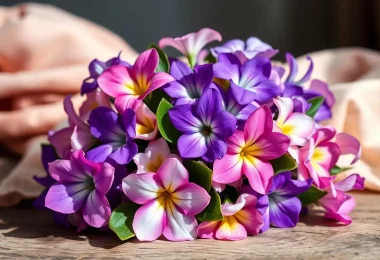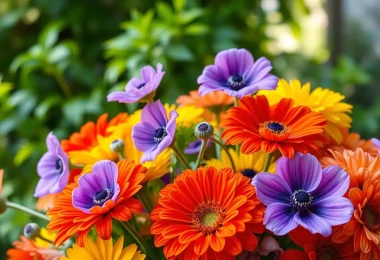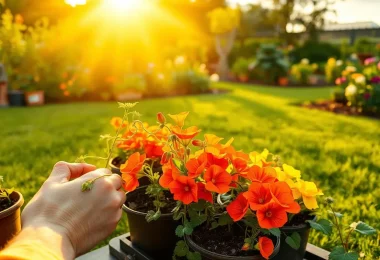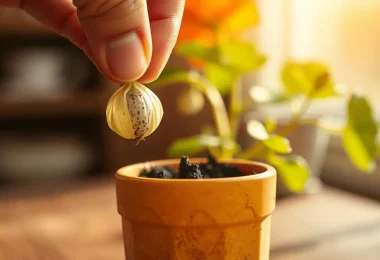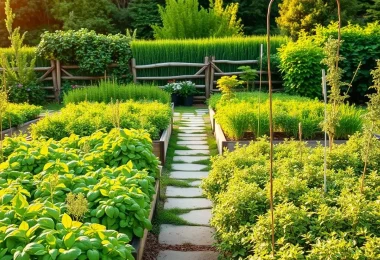Imagine stepping outside and picking fresh herbs to make your food taste better or to relax. Growing your own herb garden is a fun and rewarding journey. It’s great for garden lovers and food enthusiasts alike. This guide will help you grow a healthy and sustainable herb garden that fits your needs.
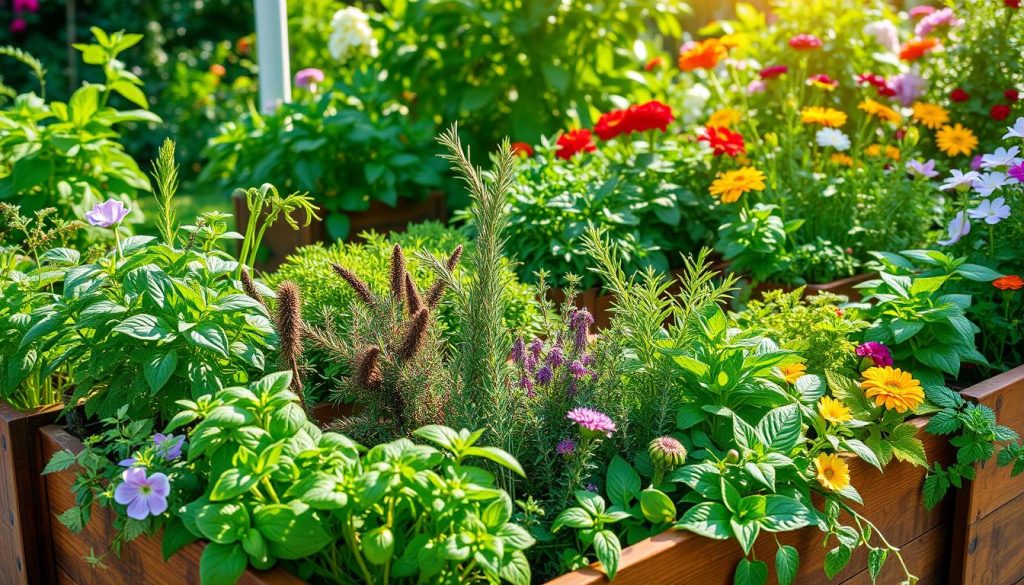
Key Takeaways
- Discover the joy of growing your own herbs at home, from the aromatic allure to the culinary creativity they inspire.
- Learn how to choose the right herbs for your garden, based on your climate, space, and personal preferences.
- Explore techniques for preparing the perfect planting spot, ensuring your herbs thrive with the right soil and sunlight conditions.
- Dive into the art of planting, caring for, and maintaining a bountiful herb garden, including tips on pest and disease prevention.
- Uncover creative ways to design your herb garden layout, even in small spaces, and enjoy the sensory delights it brings.
Herb Gardening: A Delightful Journey for the Senses
Imagine a peaceful spot in your garden filled with the sweet smells of fresh herbs. This is what herb gardening offers, a journey that touches all your senses. You’ll find a world of sights, smells, and tastes waiting for you.
The Aromatic Allure of Fresh Herbs
Enter your herb garden and be surrounded by amazing scents. You’ll smell the earthy rosemary, the zesty lemon thyme, and the soft lavender. Each herb has its own special smell, inviting you to explore and find new scents in your garden.
Culinary Creativity at Your Fingertips
Herb gardening opens up a world of cooking possibilities. Just think of using fresh basil to make your tomato salad better, or oregano to add depth to your pizza. Growing herbs lets you add fresh, tasty touches to your food, boosting your cooking skills.
As you care for your herb garden, you’ll see these plants grow from tiny seeds to full, flavourful plants. This hands-on work not only delights your senses but also makes you appreciate the food you eat more.
“Herbs possess the power to transport us to other times and places, igniting our senses and inspiring culinary innovation.”
Choosing the Right Herbs for Your Garden
Starting an herb garden is exciting. It’s all about picking the right herbs for your garden. Whether you’re new to gardening or have experience, knowing your options is key. This way, you can grow a variety of herbs that taste great and are easy to care for.
When picking herbs, think about a few things:
- Climate and growing conditions: Choose herbs that do well in your area. Some, like lavender and rosemary, love the sun and dry soil. Others, like mint and parsley, prefer shade and moist soil.
- Culinary preferences: Pick herbs that you like to use in cooking. Popular ones include basil, thyme, oregano, and chives. Each adds a unique taste to your dishes.
- Space constraints: If your garden is small, choose compact herbs or grow them in pots. Herbs like bay, sage, and marjoram are great for small spaces.
Here’s a table to help you plan your herb garden:
| Herb | Characteristics | Best Uses |
|---|---|---|
| Basil | Fragrant, warm flavour, prefers warm, sunny conditions | Pesto, tomato dishes, salads |
| Rosemary | Earthy, pine-like aroma, thrives in well-drained soil and full sun | Roasted meats, potatoes, Mediterranean cuisine |
| Mint | Refreshing, versatile flavour, spreads quickly, prefers partial shade | Teas, salads, desserts |
| Thyme | Woody, earthy taste, tolerates drought and poor soil | Soups, stews, roasted vegetables |
Think about your garden, what you like to eat, and how much space you have. This way, you can create a garden that’s full of life and flavour. Your meals will taste amazing with fresh herbs from your garden.
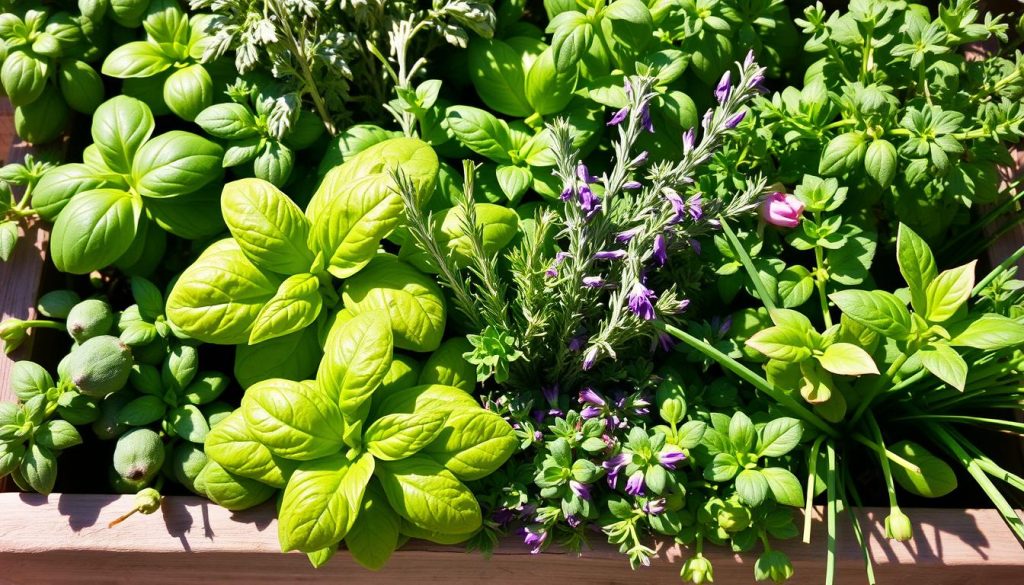
Preparing the Perfect Planting Spot
Creating the ideal environment for your herb garden is key to its success. Whether you have a big backyard or a small urban space, knowing the best soil and sunlight is crucial. It makes a big difference in growing your aromatic herbs.
Soil Secrets: Unlocking the Key to Thriving Herbs
The foundation of a thriving herb garden is the soil. Herbs do well in well-draining, nutrient-rich soil that’s slightly acidic. The pH should be between 6.0 and 7.0.
To prepare the soil, mix in compost or aged manure. This improves drainage and adds nutrients. Make sure the soil is loose and crumbly. This lets the herb roots spread and grow well.
Sunlight and Shade: Finding the Ideal Balance
- Most herbs need at least 6 hours of direct sunlight a day. Some, like rosemary and lavender, need even more.
- For herbs that like partial shade, like mint and parsley, pick a spot with dappled sunlight. Or shade during the hottest times.
- Don’t plant in too much shade. It makes herbs grow weak and tasteless.
| Herb | Sunlight Requirements |
|---|---|
| Basil | Full sun |
| Thyme | Full sun |
| Mint | Partial shade |
| Parsley | Partial shade |
By thinking about soil preparation and sunlight requirements for your herb garden location, you can make the perfect spot. This will help your herb garden thrive and grow well.
Planting Techniques for a Bountiful Herb Garden
Creating a thriving herb garden at home needs careful planning. Each step, from sowing seeds to growing herbs, is vital for a good harvest. Let’s dive into the joy of making your own herb garden.
Sowing Seeds: A Rewarding Beginning
Starting your herb garden with seeds is very rewarding. Herb planting from seed lets you see your plants grow from start to finish. It connects you more to nature. You can choose to sow seeds directly or start them indoors.
Some herbs do well when planted straight into the garden. Others prefer the warmth and head start of indoor herb propagation. Try different methods to find what works best for your area.
| Herb | Optimal Planting Technique |
|---|---|
| Basil | Indoor seed starting |
| Rosemary | Direct seed sowing |
| Thyme | Both direct sowing and indoor propagation |
Learning to plant herbs from seed will give you a rich harvest. You’ll also enjoy seeing your herbs grow from the start.
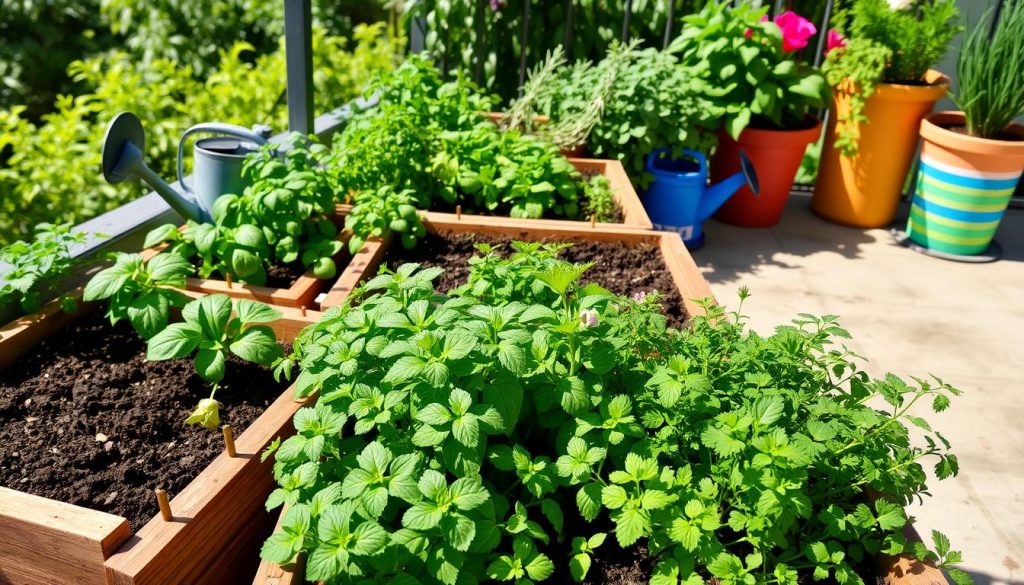
Herb Garden Care and Maintenance
Keeping your herb garden healthy is key to a great harvest. Learning how to water, prune, and fertilise is important. It helps your plants grow well all year round.
Watering Wisdom: Keeping Your Herbs Hydrated
Watering right is the first step to a healthy garden. Most herbs do best when the soil is moist but not too wet. Water them in the morning or evening to avoid losing water in the heat.
Change how often you water based on the weather, rain, and soil type. This way, your herbs get the right amount of water.
- Water deeply, allowing the soil to absorb the moisture thoroughly.
- Check the soil’s moisture level by sticking your finger into the soil up to the second knuckle.
- Use a watering can or a hose with a gentle spray to avoid disturbing the plants.
- Be mindful of the unique watering needs of different herb varieties.
Keeping up with herb garden care and herb maintenance is crucial. Proper watering helps your herbs stay healthy and productive.
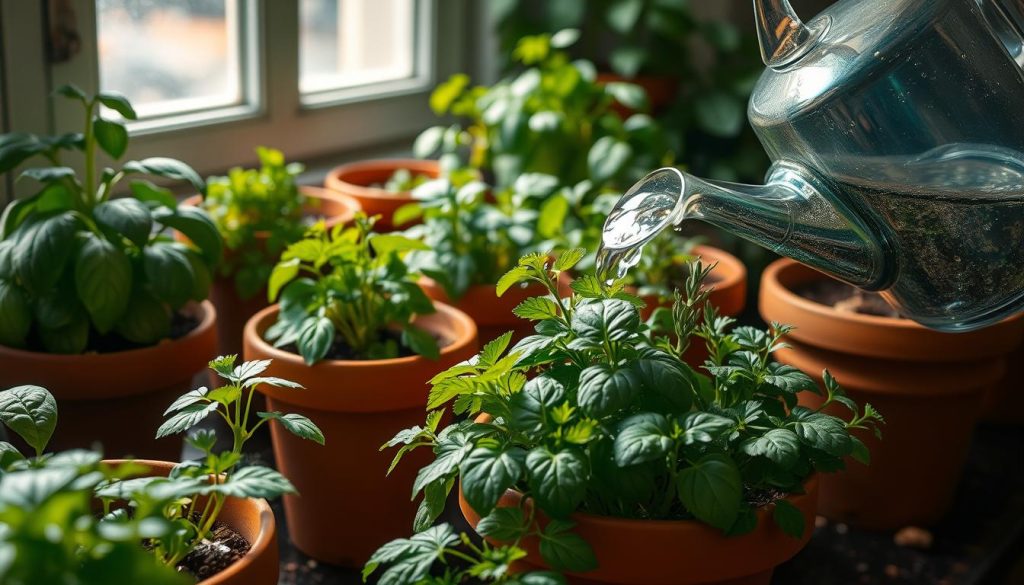
“The secret to a thriving herb garden lies in the delicate balance of water and soil. Nurture your plants with care, and they will reward you with a bountiful harvest.”
Pest and Disease Prevention in Herb Gardens
Keeping your herb garden healthy means watching out for pests and diseases. Using the right prevention methods helps protect your herbs. This way, you can enjoy a full harvest. Let’s look at natural ways to keep pests away and fight off diseases.
Embracing Organic Pest Management
For a sustainable herb garden, organic pest control is best. It aims to keep pests away without using harmful chemicals. Here are some organic methods:
- Bring in beneficial insects like ladybirds and lacewings to eat pests.
- Use natural repellents like garlic, onions, or essential oils to keep pests away.
- Grow companion plants that help keep pests off your herbs.
Tackling Common Herb Diseases
Herbs can also get sick. Watching them closely and acting fast is important. Here are ways to fight herb disease control:
- Make sure the soil drains well to avoid waterlogged soil and fungal diseases.
- Regularly prune and thin your herbs to improve air flow and stop disease spread.
- Use organic fungicides like copper-based solutions to treat diseases.
By using organic pest management and herb disease control, you can have a healthy, chemical-free herb garden. It will be full of vibrant, healthy plants.
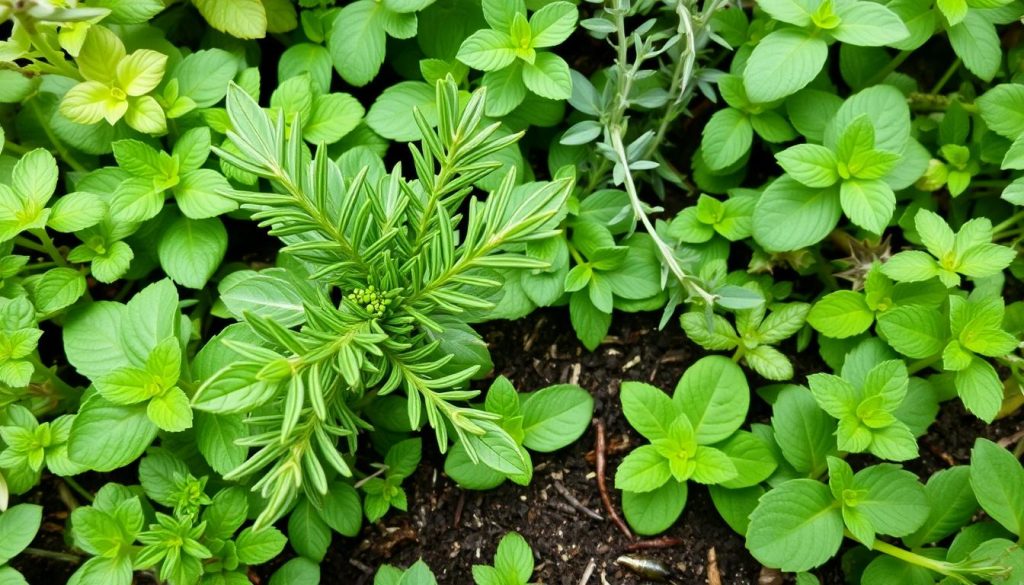
“Healthy herbs start with a healthy ecosystem. Embrace nature’s balance to cultivate a truly sustainable and bountiful herb garden.”
| Common Herb Garden Pests | Effective Organic Solutions |
|---|---|
| Aphids | Introduce ladybirds and lacewings |
| Spider mites | Use garlic or essential oil sprays |
| Slugs and snails | Deploy beer traps or crushed eggshells |
| Cutworms | Grow companion plants like marigolds |
Harvesting and Preserving Your Herb Bounty
Growing an herb garden is very rewarding. The real fun is in harvesting and preserving your herbs to enjoy all year. Whether you’re new to gardening or have lots of experience, knowing how to harvest, preserve, and store herbs is key. It helps keep their flavour and scent at their best.
Drying, Freezing, and Storing Fresh Herbs
Drying is a popular way to keep herbs fresh. It helps keep their strong flavours and smells. Freezing is also great, as it keeps herbs’ colours bright and their texture soft.
- Drying herbs: Hang bunches upside down in a cool, dry spot with good air flow. Or, lay them out on a baking sheet and dry in a low oven.
- Freezing herbs: Chop or puree them, then freeze in ice cube trays or small containers. This saves their oils and tastes.
- Storing dried and frozen herbs: Store dried herbs in airtight containers in a cool, dark spot. Frozen herbs stay good for up to 12 months if stored right.
Learning these preservation methods means you can enjoy your herbs’ flavours and smells all year.
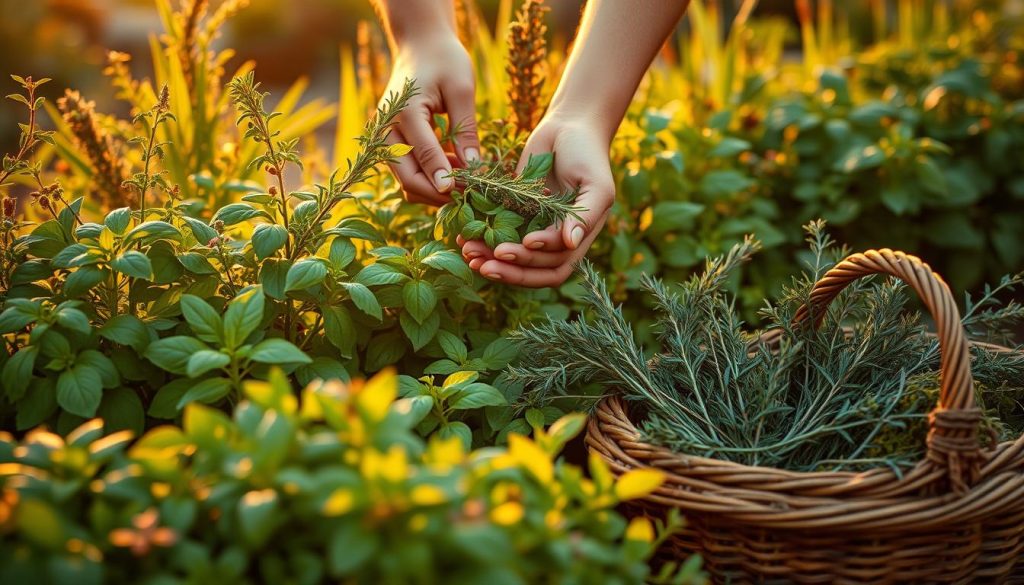
“Preserving the harvest is like capturing a moment in time, allowing you to relive the flavours and aromas of your garden all year round.”
Designing Your Herb Garden Layout
Creating a beautiful and useful herb garden is key. You can make your garden stunning, whether you have a big outdoor space or a small balcony. The right design makes a big difference in how your garden looks and works.
It’s important to mix beauty with practicality in your garden design. Arrange your herbs in a way that looks good and is easy to use. Herb garden layout depends on the space you have, the types of herbs, and what you like.
Crafting a Harmonious Herb Garden Design
- Group herbs with similar growing needs together for easier care.
- Use a variety of heights, textures, and colours for interest.
- Use vertical space with tiered planters or hanging baskets for small areas.
- Make paths or walkways for easy access and to avoid crowding.
- Place taller herbs so they don’t block the view of smaller ones.
By planning your herb garden carefully, you can make a garden that’s both beautiful and useful. Try out different herb garden design ideas to find the best one for your space and taste.
| Herb | Ideal Placement | Sunlight Requirements |
|---|---|---|
| Basil | Front or centre of the garden | Full sun |
| Rosemary | Trailing along the edges | Full sun |
| Thyme | Edging or between pavers | Full sun to partial shade |
| Mint | Contained in a pot or planter | Partial shade |
By thinking about your herb garden‘s layout and design, you can make a space that’s great for cooking and looks amazing too.
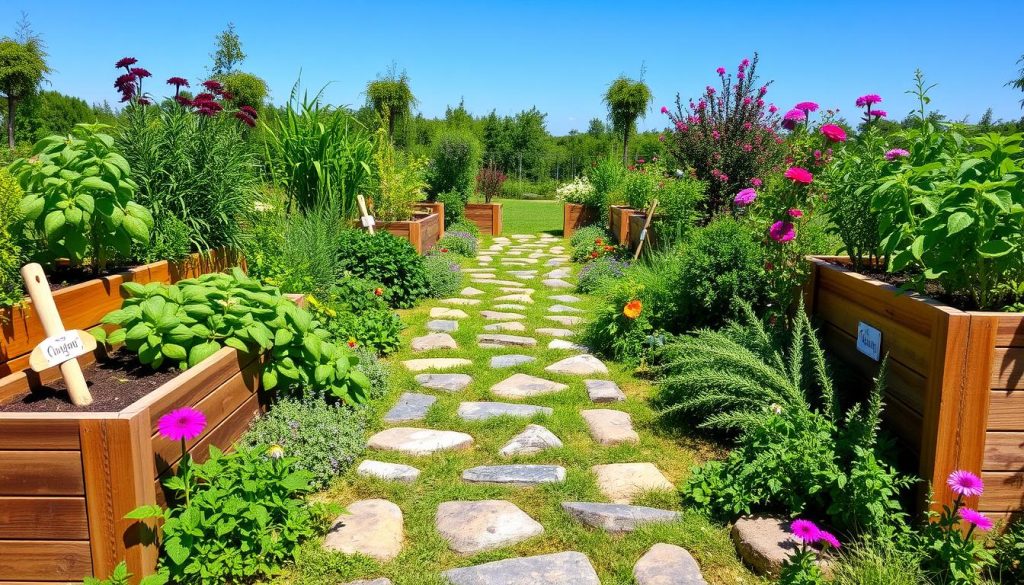
Herb Garden Ideas for Small Spaces
Don’t let a small space stop you from gardening. You can create a lush herb garden in even the tiniest spots. Whether it’s a balcony, patio, windowsill, or indoor corner, there’s room to grow small space herb gardens.
Container Gardening: Bringing Herbs to Life
Container gardening is a great way to grow herb container gardening. Pots, planters, and hanging baskets are perfect for small spaces. They let you grow a lot in a little area, even in cities.
Get different sizes of containers for various herbs. This makes your urban herb garden lively and full of variety.
- Choose lightweight, well-draining containers for the best herb growth.
- Go for compact herbs like rosemary, thyme, and oregano that do well in tight spots.
- Use vertical space with hanging baskets or wall planters to save room.
With some planning and the right containers, you can enjoy fresh herbs in any small space.
Herb Garden Companion Planting
Boost your herb garden’s health and productivity with companion planting. This method uses the special bonds between herbs to create a balanced herb garden ecosystem. It benefits every plant in the garden.
Knowing which herbs go well together can make your garden flourish. You’ll see a herb garden community thriving. The secret is to pick herbs that complement each other. They should help each other grow, taste better, and fight off pests.
For example, basil and tomatoes together taste amazing. They also keep aphids away. But, keep mint separate to stop it from taking over.
- Companion planting creates a balanced, self-sustaining herb garden ecosystem.
- Certain herb pairings can enhance flavour, deter pests, and improve overall plant health.
- Strategically placing herbs in your garden can maximise the use of available space and resources.
Explore the world of companion planting and watch your herb garden community grow. By using the natural connections between herbs, you’ll get a rich harvest. Your garden will become a lush, sustainable haven.
The Herb Garden as a Sensory Delight
Step into the world of an herb garden, where sights, scents, and textures come alive. Learn to create your own herb garden senses and enjoy the healing power of an aromatherapy garden.
Building a sensory herb garden is a fun way to engage your senses. It brings relaxation, mindfulness, and a love for nature. With vibrant colours and calming smells, every part of your garden can delight your senses.
Sight: A Tapestry of Verdant Hues
Walking through your herb garden, your eyes will enjoy the variety of greens. From rosemary’s deep leaves to dill’s soft fronds, it’s a feast for the eyes. Mix different textures and shapes to make your garden visually stunning.
Scent: A Fragrant Oasis
The charm of an herb garden is its enticing smells. Plant herbs like lavender, mint, and thyme. Their fragrances will fill the air, offering a calming and uplifting experience.
Touch: Exploring Textures
Touch different herbs to feel their unique textures. Sage’s fuzzy leaves and chamomile’s soft petals are just a few examples. Let visitors touch the plants to feel grounded and present.
Designing your herb garden to engage all senses creates a calming space. It nourishes your mind, body, and soul. Enjoy the magic of sight, scent, and touch in your herb garden senses experience.
Herbs for Culinary and Medicinal Uses
Make your cooking better and boost your health with your herb garden. Plants like basil and lavender can make food taste great and help you feel better.
Herbs like thyme, rosemary, and oregano are key in many kitchens. They add amazing smells and tastes to food. Plus, they’re good for you too.
- Thyme: It’s full of antioxidants. Thyme has helped people with breathing problems and boosted their immune system for ages.
- Rosemary: This herb is great for your brain and digestion. It can make you think clearer and feel better in your stomach.
- Oregano: It’s got compounds that fight germs and reduce swelling. Oregano can help with colds and sore throats.
Medicinal herbs like chamomile, peppermint, and echinacea are also great for your garden. They have lots of health benefits.
“Herbs are the friends of physicians and the praise of cooks.”
– Charlemagne
Using your medicinal herbs in teas or creams can help with stress, sleep, and skin problems. They can also ease breathing issues.
Discover the amazing things your herb garden can do. Use it to make your food taste amazing and improve your health. Your garden is a treasure trove of wellness.
Herb Garden in Winter: Extending the Growing Season
Don’t let the cold stop your winter herb gardening plans. Find ways to keep your indoor herb gardens alive all year. Learn how to grow year-round herb growing indoors and protect outdoor plants from the weather.
With some planning and effort, you can have fresh herbs all year. You can grow them indoors or protect them outside. The options for winter herb gardening are endless.
Embracing Indoor Herb Gardening
Growing herbs indoors in winter is a great way to have fresh herbs always. Pick year-round herb growing types like basil, mint, and chives. Place them near a sunny window or under grow lights.
- Choose compact, bushy herbs for container gardening.
- Make sure your indoor indoor herb gardens get at least 6 hours of direct sunlight daily.
- Get a growing lamp to help with natural light and plant growth.
Protecting Outdoor Herb Plants
If you want to keep your winter herb gardening outdoors, there are ways to protect your herbs. Use strategies to keep them safe from cold and harsh weather.
- Use a thick layer of straw, leaves, or organic material to mulch your herb beds. This insulates the roots.
- Build a simple cold frame or mini greenhouse to protect your plants from frost and wind.
- Put cloches or row covers over individual plants to trap warmth and keep them warm.
By facing the challenges of winter herb gardening, you can enjoy growing herbs all year. You’ll have the freshness and flavour of homegrown herbs even in the coldest months.
The Joys of an Herb Garden
Having your own herb garden at home is incredibly rewarding. It brings joy and fulfillment. You get to watch your plants grow and enjoy the benefits they offer.
Herb gardening is calming and therapeutic. Seeing your plants thrive is a great feeling. The scents from the herbs can also lift your mood.
An herb garden opens up new culinary adventures. You can easily add fresh herbs to your meals. This makes cooking more fun and rewarding.
Herbs are also good for your health. Many herbs have healing properties. They can be used in natural remedies and teas.
Herb gardening connects you to nature. It teaches you to appreciate the natural world. This can make you more mindful and grounded.
Herb gardens offer many joys. They inspire your cooking, improve your health, and create a peaceful space. Embrace the benefits of herb gardening, herb garden wellbeing, and herb garden lifestyle for a fulfilling experience.
“Herbs are the friends of physicians and the praise of cooks.”
– Charlemagne
Conclusion
We’ve reached the end of our guide, and we hope you’re ready to start your herb garden. Fresh herbs add a special touch to cooking and bring joy to your garden. We’ve shown you the many benefits of growing herbs at home.
Whether you’re new to gardening or have experience, this guide has something for you. You now know how to start an herb garden and keep it healthy. You’ve learned about choosing herbs, planting, caring, and harvesting. This knowledge will help you create a herb garden summary that will make your senses happy and improve your cooking.
Keep exploring herb gardening resources online, in books, and through local gardening groups. These resources offer more ideas, tips, and support. They will help your herb garden grow and thrive for many years.
FAQ
What are the benefits of growing an herb garden at home?
Growing herbs at home brings many benefits. You get fresh herbs for cooking. It’s a sustainable way to grow herbs. Plus, it’s a hobby that can relax and improve your well-being.
What are some popular herbs to grow in a home garden?
Popular herbs include basil, parsley, and rosemary. Thyme, mint, chives, cilantro, and lavender are also favourites. They’re easy to grow and great for cooking and health.
How much sunlight do herbs typically require?
Most herbs need at least 6 hours of sunlight a day. But, some like mint and parsley prefer shade. Others, like rosemary and lavender, need full sun.
How should I water my herb garden?
Watering is key for your herbs. They like well-drained soil and should be watered when the top inch is dry. Don’t overwater to avoid root rot. Water in the morning or evening to reduce evaporation.
How can I prevent pests and diseases in my herb garden?
Use natural methods to keep pests away. Companion planting and introducing beneficial insects help. Neem oil or insecticidal soap can also work. Good air flow, removing weeds, and proper drainage also help.
How can I extend the growing season for my herb garden?
To grow herbs all year, consider indoor growing in winter. Use cold frames or greenhouses for outdoor plants. Choose cold-hardy varieties for year-round growth.
How do I harvest and preserve my homegrown herbs?
Harvest herbs at the right time and preserve them well. Dry, freeze, or store in airtight containers. This way, you can enjoy your herbs all year.
What are some creative ways to design my herb garden layout?
Design your garden creatively. Use raised beds or containers. Create themed gardens or use companion planting. These ideas help use space well and enhance your garden’s ecosystem.




